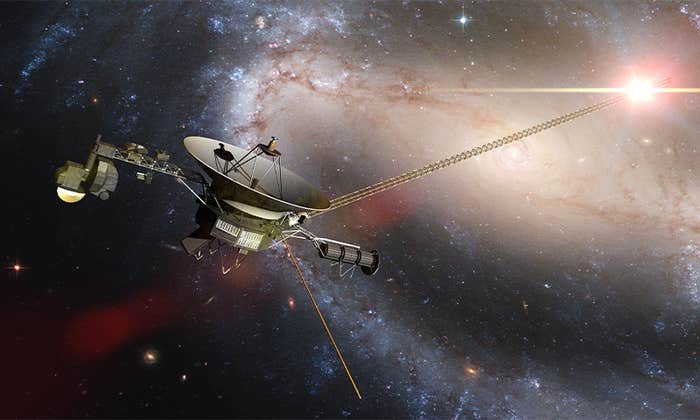Marcia Bjornerud would like to change the way you think about time. This is not so surprising for a geologist who spends days contemplating millennia and eons, which tends to put yesterday’s headlines in perspective. Most geologists have an uncanny ability to look at a landscape and mentally erase the past 10,000 years or so. But Bjornerud, a professor of geology and environmental studies at Lawrence University, in Wisconsin, believes learning to think in longer timescales and about the planet’s deep past is essential for anyone who cares about the future.
Bjornerud wrote lyrically about Earth’s temporal rhythms in her landmark 2018 book, Timefulness: How Thinking Like a Geologist Can Help Save the World (excerpted in Nautilus).
I caught up with her on To The Best Of Our Knowledge to see how her thinking has evolved since then.

Why do you think we have such a hard time relating to deep time? I mean, we’ve been to museums and marveled at dinosaur fossils. And yet, most of us can’t really conceptualize time in those terms. Do you think it’s because the numbers are just too big?
It’s so many things, ranging from personal vanity and the fear of aging to the way our economy and political systems run. We’re always on a two-year congressional cycle or an annual report business cycle, so we have a very blinkered view of time.
So, of course, we’re intellectually aware of dinosaurs and the geological record, but I don’t think most people have had the opportunity to internalize what that means. I’m trying to open the doors to people and help them see landscapes and rocks not as inert and insensate, but as fellow inhabitants of Earth that have stories.
Yeah, when you write about the previous ages of the Earth, it feels like the past is not dead.
Absolutely. I mean, the rocks that formed in the distant past, those old ones, are still with us, and they shape the landscapes we’re familiar with. They’re interacting with modern day climate.
If there’s a deep time, there’s a deep future as well.
In Western culture and in science, we draw a line between animate and inanimate. But there are Indigenous cultures that have the concept of rocks as alive and in some cases conscious. Does that resonate for you?
I hesitate to say they’re conscious in any simple human sense. But I think rocks are sentient and paying attention to their environment. Mountains don’t just exist. They come into being through tectonic collisions, and we can model them growing. So in that sense, I will say, yes, rocks are animate.
Take the process of subduction. That’s the signature tectonic process of Earth, in which the ocean crust, once it becomes cool and dense enough, sinks back into the mantle and can generate terrible earthquakes and tsunamis in places like Indonesia or Japan. That process is essential for the long-term habitability of the Earth, because it unites the atmosphere and the hydrosphere system. There’s probably an ocean’s worth of water in the Earth’s mantle, which is kind of a planetary savings bank. And eventually, that’s exhaled again through volcanism. And there’s some kind of deep wisdom there, because these aren’t just connected cycles, they’re processes that maintain some kind of steady state.
Do you think the perspective of deep time can help with any of the existential fear and dread that comes with an awareness of climate change and global warming?
From a scientific point of view, I can say that Earth will be fine. The Earth will deal with the changes in climate that we’re causing and eventually, new ecosystems will emerge.
But the human part of me mourns what we’ve done and the rapidity with which old, well-established ecosystems and landscapes have been changed. And I worry for humanity, for what the next decades or century will bring as we cope with a new set of rules. That’s the scary thing to me. We’ve been able to understand the way the planet has worked through the Holocene, but now we’re changing the boundary conditions and parameters. The past won’t necessarily be a key to the future. Our cultures have grown up with a certain version of Earth, and it’ll be radically different.
So there are real stakes to thinking and talking about deep time. It’s not just about waking up to the geological wonder of life on this planet, or being able to perceive more of the magic beneath our feet—it’s about the future of the planet and our species.
To me, it’s about recognizing that we’re part of a continuum. If there’s a deep time, there’s a deep future as well.
The Anthropocene, for example, is an important concept that most people are aware of now. But in some ways, I think it’s preventing people from seeing past the current moment. The Anthropocene is all about the much-too-large footprint we are having on the planet. I’d like us to start thinking about a post-Anthropocene world, in the distant geologic future. How can we imagine ourselves living differently as human Earthlings?
Maybe by imagining what the Earth might be like without us?
I’d like to think we will be here, that there will still be humans. I think we can do better.
Excerpted from Deep Time, a series from To The Best Of Our Knowledge, hosted by Anne Strainchamps. Deep Time explores new ways of thinking about the fourth dimension through conversations with scientists, historians, and philosophers. Listen and learn more at ttbook.org/deeptime.
Lead image: O-IAHI / Shutterstock


























